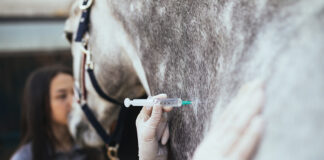In our Ask the Vet column, Dr. Lydia Gray answers your horse-health questions at horseillustrated.com/AskTheVet. Got a question for Dr. Gray? Send it to horseillustrated@egmediamags.com and use subject line “Ask the Vet.”
Q: My dad is going to retire from the military probably in March next year, and for us that means we have to haul my horse from North Carolina to Texas where we plan to keep him at my grandparents’ house. Are there any vaccinations and tests I need to have for him before we go, and what do I need to look out for health-wise once we get there? We’ve always done cross-country moves before but never with a horse.

A: Congratulations and thanks to your dad, and how exciting for everyone! Although I do routinely check in with the latest research and recommendations for transporting horses, my go-to resource remains Guidelines for Horse Transport by Road and Air edited by Catherine W. Kohn. Below I’ve put together a condensed version of what the experts she gathered together advice for cross-country trips such as yours.
Before travel
Your best chance of having a happy, healthy horse when you arrive at your destination is to start with one. If you know your horse is sick or unsound, chances are he’s not going to improve with a trip to a new place, with a new schedule, around new horses. Stay home until he’s back to his old self.
Horses that are hale and hearty may still need a veterinary examination before traveling. Talk to your veterinarian and find out exactly what vaccinations, blood tests, and paperwork (like a Coggins test, health papers, and entry permit) you will need for your trip–different states have different rules. Then make sure the horse’s health record goes with him, whether you’re driving or you’ve hired a driver. Also bring a first aid kit as well as the phone numbers of veterinarians along the way. Of course, if your horse is on any medications or supplements, bring those along too, with all the hay and grain needed for the entire trip.
Next, accustom your horse to loading, riding in a trailer, and wearing protective gear well before the actual trip. If your horse is not used to being in a stall and where you are going requires him to be stabled, you may want to get him used to confinement as well. While laxatives such as mineral oil or bran mashes are probably unnecessary, electrolytes, antioxidants and certain vitamins may help horses recover more quickly from long-distance transport. Also, begin reducing the amount of grain your horse receives in his last few meals before the trip.
During travel
Generally speaking, while trips over three hours are considered “long-distance” and require more planning, “short-distance” trips under three hours should still be well-thought out to keep your horse’s stress at a minimum. Stress during transport can lead to such problems as colic, diarrhea, dehydration and “shipping fever,” or, respiratory disease.
During a long-distance trip, check your horse and offer water every four hours. But try not to spend more than 15 to 30 minutes doing this, as horses only really “rest” when they are unloaded and for some, the stress of stopping—let alone being loaded and unloaded—is more than the stress of the trailer ride. Experts recommend that horses not be trailered more than 12 hours in one day. If the entire trip is longer than this, then horses should be unloaded and allowed 8 hours of rest and recovery before continuing. Research has shown that riding in a trailer is real work for a horse, using as many calories as walking and twice as many as resting.
It seems that horse owners are always debating whether or not to tie horses in trailers! The design of some trailers means you have to tie your horse for safety reasons, but if possible, transport horses in box stalls that allow them to face the direction they prefer and, more importantly, put their heads down. Not only does this help them balance, it also helps them clear their airways of debris, bacteria and viruses, and discharge which could lead to respiratory disease. You can help reduce the amount of dust, molds and other allergens floating in the air by wetting the hay he will be eating in transit and using the most dust-free bedding possible.
After travel
Upon arrival, first check your horse from head to hoof to make sure he’s healthy and sound. Look for any injuries that may have occurred during loading, traveling, or unloading and make sure he’s bright, alert, and responsive. Next, help him unwind with 30 minutes of hand walking or turnout in a paddock if available, along with the opportunity for a drink and some hay or grass. If your trip was less than six hours, this may be all the recovery your horse needs!
For trips longer than six hours however, your horse may need a whole day before he’s ready to go to work. And horses that have traveled more than 12 hours may need two or three days before they can be expected to perform. During this time, continue to observe him for signs of disease or illness while gradually increasing his grain ration back to the regular amount.
I wish you, your family, and your horse much success in your new adventures!






